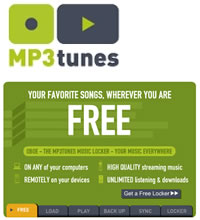 Oboe, the MP3Tunes.com online music service is increasing its previous 1Gb of free music storage to unlimited storage to some of its registered users.
Oboe, the MP3Tunes.com online music service is increasing its previous 1Gb of free music storage to unlimited storage to some of its registered users.
The bold move was signalled when we received an email notification today that our account had been given the magic blessing.
MP3Tunes takes a different approach to iTunes and other on-computer music management software. Rather than have all of your music stored on the machine you are listening to it on, the music is stored on the Internet.
To listen to the music you can either use their application; or plugins for Browsers (Firefox or ie); or media players (iTunes and Winamp). Access to the music is also free.
This brings the advantage that your music can be played by any Internet-attached computer or device that you might have to hand, including TiVo, Nokia 770 and Series 60 phones.
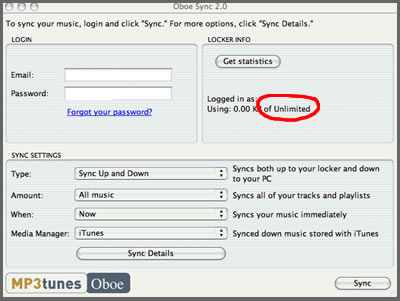
Uploading music is done using their Oboe Sync 2.0 software which runs on Microsoft Windows 2000/XP, Mac OSX and Linux.
They’re not sniffy about the music file formats either, with a comprehensive selection supported (MP3, MP4, M4A, M4P, AAC, WMA, OGG, AIF, AIFF, MIDI). Pointedly it is also stated that “Digitally Restricted Files may not play.”
The unlimited service, previously called Premium, used to cost $40/year. As with their previous offering, there may limits on the size of each file that you upload, but at time of going to press, this remains unclear.
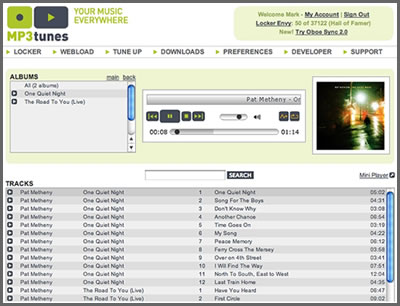
A bit of history for you …
Mp3Tunes was started by Michael Robertson, the founder of MP3.com, the trail blazing music service that started in 1998 and eventually had to close after a concerted legal attack by the music business.
In 2000 mp3.com started my.mp3.com, a service very similar to the Oboe service offered now offered by MP3Tunes. We hope that their new service doesn’t suffer the same end.
Impact
We think this move to an unlimited service could just start to put a dent in the dominance of iTunes, particularly in Europe, where legal pressure is building on them.
Being able to access music collections from work as well as home, without having to physically carry them, is a big boost.
As far as sustaining the service, because clearly there’s a fair cost in offering something like this, we assume the income will arise from the sale of additional music to the people who embrace the service.p
 Are you always late for work? Does your alarm clock fail to wake you up in the morning? Have you developed a reflex action that bashes the ‘alarm off’ button while you carry on counting sheep?
Are you always late for work? Does your alarm clock fail to wake you up in the morning? Have you developed a reflex action that bashes the ‘alarm off’ button while you carry on counting sheep? When it’s time for you to get out of your jimjams, this totally daft clock launches a flying propeller that hovers around the room, making strange buzzing noises while the clock’s alarm sounds.
When it’s time for you to get out of your jimjams, this totally daft clock launches a flying propeller that hovers around the room, making strange buzzing noises while the clock’s alarm sounds.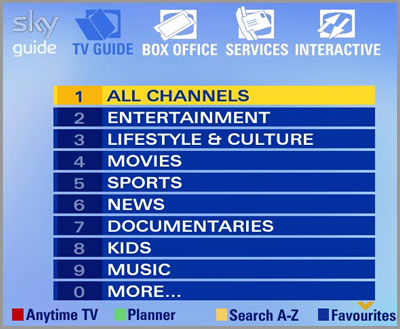

 Casio has knocked out two additions to its pocket pleasing, ultra-slim Exilim Zoom range in the shape of the 10.1-megapixel EX-Z1050 and the 7.2 million pixel Exilim Zoom EX-Z75 cameras.
Casio has knocked out two additions to its pocket pleasing, ultra-slim Exilim Zoom range in the shape of the 10.1-megapixel EX-Z1050 and the 7.2 million pixel Exilim Zoom EX-Z75 cameras. Onboard there’s Casio’s EXILIM Engine 2.0 offering new motion analysis technology, with the camera able to rattle off a claimed 7 shots per second until the memory tank hits full.
Onboard there’s Casio’s EXILIM Engine 2.0 offering new motion analysis technology, with the camera able to rattle off a claimed 7 shots per second until the memory tank hits full. EXILIM Zoom EX-Z75
EXILIM Zoom EX-Z75 Bill Gates launched Vista this morning by emphasizing the role of the general public in its conception. “We’ve got over 5 million beta testers to thank,” he told a packed audience at the British Library in London. “They’ve helped to make sure that Vista is the highest quality product we’ve ever released. And then we picked 50 families and talked to them about how they used computing in their daily lives, generating over 800 changes in the final version.”
Bill Gates launched Vista this morning by emphasizing the role of the general public in its conception. “We’ve got over 5 million beta testers to thank,” he told a packed audience at the British Library in London. “They’ve helped to make sure that Vista is the highest quality product we’ve ever released. And then we picked 50 families and talked to them about how they used computing in their daily lives, generating over 800 changes in the final version.”
 Two notebooks containing work by Leonardo da Vinci, know as the Codices, have been digitally reunited today at the launch of Windows Vista.
Two notebooks containing work by Leonardo da Vinci, know as the Codices, have been digitally reunited today at the launch of Windows Vista.

 Hot off the factory presses are three new all-black models, all with distinctive and stylish looks.
Hot off the factory presses are three new all-black models, all with distinctive and stylish looks.
 The i7 packs a 7.2 megapixel sensor, 3x optical zoom, Advanced Shake Reduction (ASR) technology, SVGA video, face recognition ISO 1600 and even an integrated MP3 player with simulated SRS 3D sound.
The i7 packs a 7.2 megapixel sensor, 3x optical zoom, Advanced Shake Reduction (ASR) technology, SVGA video, face recognition ISO 1600 and even an integrated MP3 player with simulated SRS 3D sound. They started at 4am, pegging 2,500 sheets of paper in the grass of a park to form a giant eye – the pun being that Australia was also watching the world.
They started at 4am, pegging 2,500 sheets of paper in the grass of a park to form a giant eye – the pun being that Australia was also watching the world.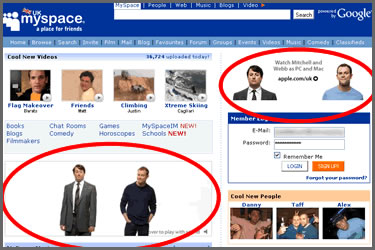 Apple must be spending large on this as it’s all over the UK MySpace pages, with double ads showing on a lot of the pages.
Apple must be spending large on this as it’s all over the UK MySpace pages, with double ads showing on a lot of the pages. Filmmakers who upload their own movies on to the video-sharing website YouTube will soon be able to enjoy some financial rewards for their efforts.
Filmmakers who upload their own movies on to the video-sharing website YouTube will soon be able to enjoy some financial rewards for their efforts.
